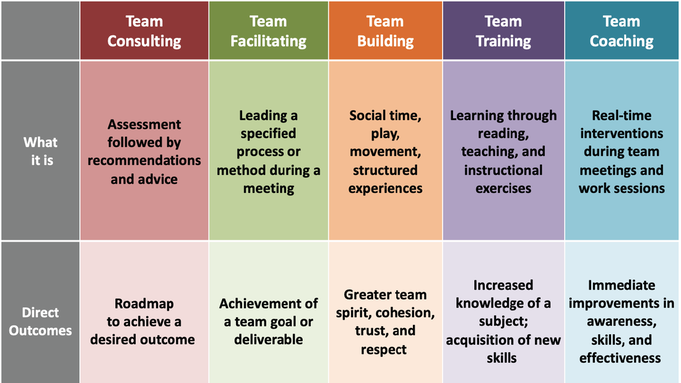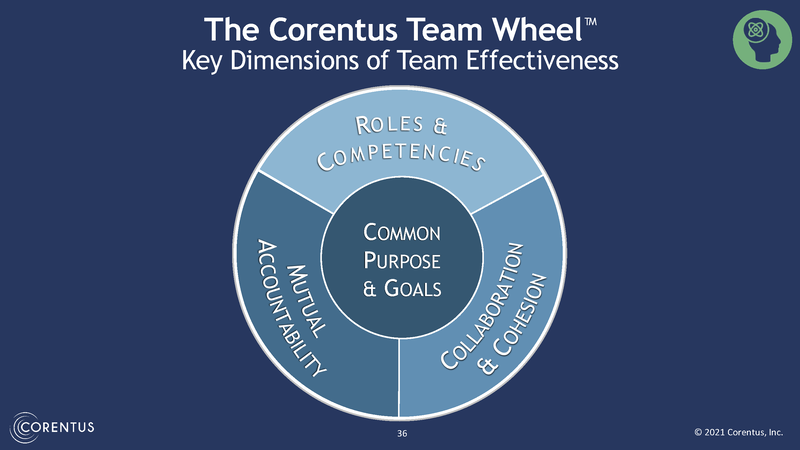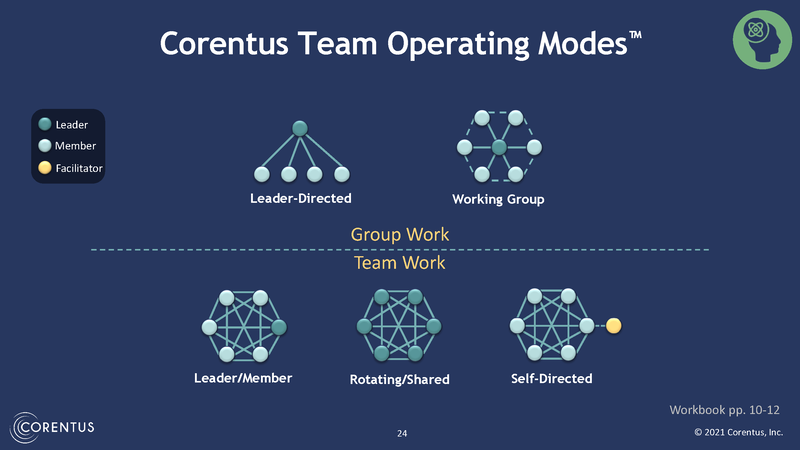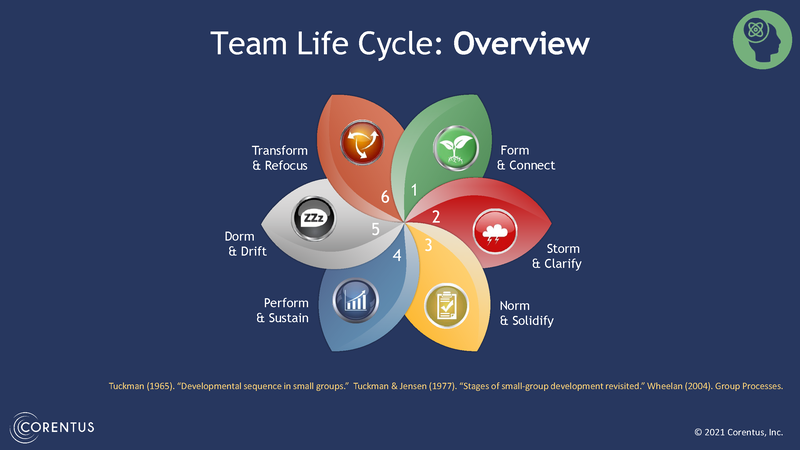Team Development
For on-going teams, we create a learning environment that provides access to the group’s collective wisdom. Through skillful facilitation and coaching, we lower the unintentional group barriers that prevent full use of team members’ insights, talents and energies in the service of shared goals. Engagements are co-designed with the client to address the specific objectives and challenges of the team.
Five Modalities
We support team development through five different modalities of work, flexibility wearing these different "hats" as team needs present themselves.
Adapted From “Understanding Team Development Practices,” Caillet and Yeager, Mobius Leadership ©
Three Frameworks
We bring a wide array of tools and frameworks to our work with teams, including these three frameworks design by Corentus. Collectively, the tools we use help teams to understand the essential capabilities and characteristics of teams, analyze their current state and identify how they want to enhance their outcomes. Together with our clients, we create a roadmap and guide them to their goals.
Client Cases
Client A:
A newly appointed university President engaged Crystal Clear Consulting to provide transition coaching for herself and to assist with development of her executive team. In short order, it became apparent that there were significant mismatches between the skills and preferences of several team members and the institutional needs as identified by the President. CCC provided coaching for the President during the year in which she made significant personnel changes.
Once the desired team was assembled, CCC designed and facilitated a two-day retreat. The focus of the retreat was on sharing and appreciating each other’s leadership journeys and style preferences, and to create a foundation for team meeting and communication norms.
In the five years since the initial retreat, CCC has facilitated approximately ten periodic retreats focused on long-term strategic visioning and planning, annual debriefing and planning, and general team health and development. CCC has also provided individual executive coaching for most of the 11 members of the leadership team.
As a result, the President is confident in what she calls her “A-Team” and only one member of the leadership team has moved on in the five years.
Client B:
Crystal Clear Consulting worked with a large cross-functional team delivering services to struggling students. The team was experiencing lack of trust, inefficient business processes, inability to manage conflict on their own, and considerable confusion and frustration with decision-making processes and authority. One important priority for the team was to debrief student cases and learn from these experiences, however they had discontinued this practice due to feelings of mistrust and blame.
CCC began by working with the key functional leaders within the larger team. After a series of discovery interviews, CCC was able to play back the “voice of the team.” This helped the leaders of the team feel heard and reflected while also helping them understand the diversity of experiences on the team. CCC employed a diagnostic tool for the team to define its desired future state and identify the forces in the system that were driving them toward that desired future, and the forces that were restraining progress.
From this work, CCC designed a series of full and half-day sessions to help the group discuss openly the sources of conflict and misunderstanding. They worked collectively to prioritize the task-related work that needed improvements and developed a plan for making progress. Sessions led by CCC included a combination of relationship building work, team discovery work, practical skill building and play. Throughout this process, CCC met regularly with the team sponsor to coach her on leading the team toward success, as well as plan and debrief each of the team sessions.
At the end of a year-long engagement, the team was able to conduct a productive and supportive debrief meeting on its own, and reported feeling more cohesive as a team throughout a significant student crisis. They had also established a committee to work on policies and decision-making, and had planned their first-ever social event together.
A newly appointed university President engaged Crystal Clear Consulting to provide transition coaching for herself and to assist with development of her executive team. In short order, it became apparent that there were significant mismatches between the skills and preferences of several team members and the institutional needs as identified by the President. CCC provided coaching for the President during the year in which she made significant personnel changes.
Once the desired team was assembled, CCC designed and facilitated a two-day retreat. The focus of the retreat was on sharing and appreciating each other’s leadership journeys and style preferences, and to create a foundation for team meeting and communication norms.
In the five years since the initial retreat, CCC has facilitated approximately ten periodic retreats focused on long-term strategic visioning and planning, annual debriefing and planning, and general team health and development. CCC has also provided individual executive coaching for most of the 11 members of the leadership team.
As a result, the President is confident in what she calls her “A-Team” and only one member of the leadership team has moved on in the five years.
Client B:
Crystal Clear Consulting worked with a large cross-functional team delivering services to struggling students. The team was experiencing lack of trust, inefficient business processes, inability to manage conflict on their own, and considerable confusion and frustration with decision-making processes and authority. One important priority for the team was to debrief student cases and learn from these experiences, however they had discontinued this practice due to feelings of mistrust and blame.
CCC began by working with the key functional leaders within the larger team. After a series of discovery interviews, CCC was able to play back the “voice of the team.” This helped the leaders of the team feel heard and reflected while also helping them understand the diversity of experiences on the team. CCC employed a diagnostic tool for the team to define its desired future state and identify the forces in the system that were driving them toward that desired future, and the forces that were restraining progress.
From this work, CCC designed a series of full and half-day sessions to help the group discuss openly the sources of conflict and misunderstanding. They worked collectively to prioritize the task-related work that needed improvements and developed a plan for making progress. Sessions led by CCC included a combination of relationship building work, team discovery work, practical skill building and play. Throughout this process, CCC met regularly with the team sponsor to coach her on leading the team toward success, as well as plan and debrief each of the team sessions.
At the end of a year-long engagement, the team was able to conduct a productive and supportive debrief meeting on its own, and reported feeling more cohesive as a team throughout a significant student crisis. They had also established a committee to work on policies and decision-making, and had planned their first-ever social event together.





